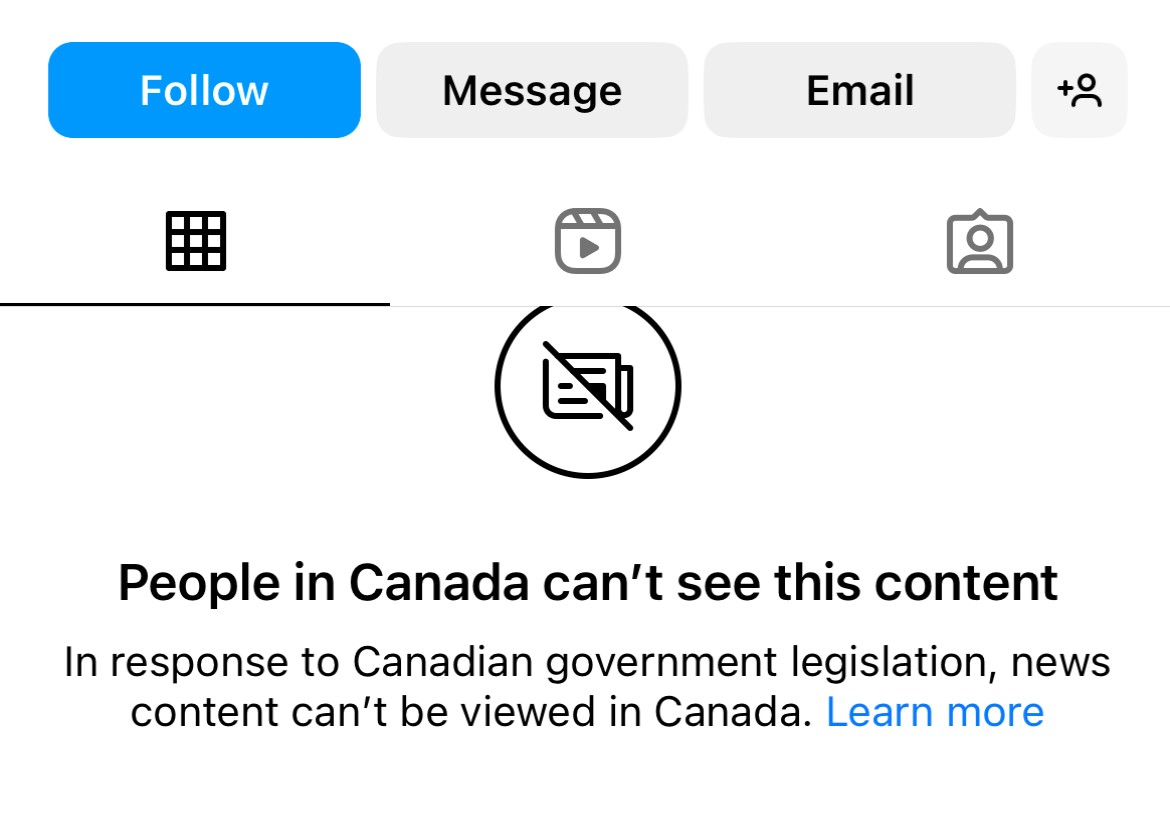Earlier this week we reported that Mark Zuckerberg’s US$728-billion company Meta was blocking The Tyee from posting to Instagram and Threads, and we asked our readers to tell us if they were having trouble sharing our stories on Meta platforms.
By Meta’s own explanation, the move was in retaliation for the recently passed Bill C-18, also called the Online News Act, which will require Meta and Google to pay for news content distributed on their platforms.
In response, Meta announced on June 1 it would be blocking some Canadian news outlets, affecting a small percentage of users in Canada. This was a prelude, said the digital giant, to removing all Canadian news content from all its platforms when the law formally goes into effect in less than six months.
Google has made a similar threat to strip all Canadian news from its platforms, timed for when the bill goes into effect.
Meta’s “randomized” tests would run for several weeks, said the digital giant, affecting news outlets both in and out of the country.
The nature of such tests was initially unclear, Meta vaguely stating: “News outlets will continue to have access to their accounts and pages, and will be able to post news links and content; however, some content will not be viewable in Canada.”
We wondered how this would be implemented, and mused over Meta’s statement that it will begin tests on both platforms and that it would “limit some users and publishers from viewing or sharing some news content in Canada.”
Then we found out “some publishers” meant us at The Tyee. On Tuesday, when I, as The Tyee’s social media manager, tried to view our Instagram profile, half of the posts had disappeared — followed by the entire feed vanishing.
A notice popped up, which read: “People in Canada can’t see your content. This account is a news publication. Content from news publications can’t be viewed in Canada in response to Canadian government legislation.”
Since then, I’ve checked numerous times a day if we’re still blocked — and whether the ban extends to Facebook.
I’ve found a few loopholes allowing me to access our accounts while Meta tests for “an effective product solution to end news availability,” but for the most part, it’s a lost cause right now.
Which is why, in the confusion of what was to come, we asked you, readers, to help us track what was going on.
We heard from dozens of you via email and on social media telling us that you are still successfully resharing our journalism to your feeds. Thank you for letting us know and for sharing our work!
Although, at least for one reader we heard from and likely more, Meta's also blocking individual users from viewing our news content.

Meanwhile, The Tyee is considering what role social media should play in a healthy news ecosystem.
We are facing problems arising as well from Elon Musk’s turbulent Twitter takeover. The company announced earlier this month that Twitter’s TweetDeck — a tool used by many journalists and newsrooms — will only be available to verified users.
That declaration followed another that said Twitter would limit the amount of posts users can read per day to address data scraping.
A Tyee occasional contributor, journalist Arno Kopecky aptly raised the question: Won’t Twitter have to be a part of Bill C-18 too?
Right now, it doesn’t appear that Twitter is included in the scope of the bill. Given Meta’s and Google’s monopoly positions over the digital advertising market in Canada, it appears only they qualify — for now.
Readers’ feelings about social media
Some Tyee readers told us they’re ditching platforms like Facebook and Twitter entirely. “I stopped using Facebook years ago due to their invasion of privacy and disrespect of anyone trying to protect their privacy by monetizing my personal data,” said Wendy.
“I also stopped using my Instagram account for the same reason. I also won’t subscribe to Threads for the same reason. I only subscribe to Twitter for personal safety news re: fire notices, earthquake, highway closures, COVID data, hospital closures, etc.”
One reader encouraged not joining Threads because its parent company is blocking us.
We would link to their tweet here, but Twitter has also recently announced that anyone who wants to view tweets will have to do so from an account — which means a large portion of our readers — those without Twitter accounts — would not be able to see it.
In the meantime, we encourage you to keep sharing our stories widely and report any error messages you might get about sharing Canadian news on your timelines, or not being able to see news outlets’ content. Email us at info[at]thetyee[dot]ca.
And keep letting us know where you want to see The Tyee the most. We’re still exploring Mastodon and TikTok, and hearing from some that we should give Bluesky a try, too.
What else is going on this week in Bill C-18?
Meta’s actions have become an international story. The U.S.-based online journalism site Vox reported on The Tyee’s experience with being blocked, its headline saying “The U.S. Might Be Next.” And more Canadian outlets reported that they have been blocked out of their Instagram accounts, including CBC and Black Press Media.
Canadian Heritage Minister Pablo Rodriguez announced earlier this week “next steps” for the bill including regulations that would establish a cap on digital platforms’ contributions to Canadian news outlets.
The fine tuning of the bill’s regulations is expected to provide clarity on what publications will qualify for contributions, including how many Indigenous news outlets or official-language minority community news outlets.
Some saw in Rodriguez’s statements a softening of C-18’s original intent. “It would appear that the government has caved on the bill as it searches for a face-saving compromise,” wrote academic Michael Geist. “Rodriguez and Prime Minister Trudeau had tough talk last week, but behind the scenes they were seemingly ready to cast aside the core principles that they claimed were essential to the legislation.
“With the government suspending its advertising on the platform (even as the Liberal party continues to advertise and MPs race to create Threads accounts), it is hard to see a road back for Meta.
“If that is the case, Bill C-18 is already a disaster as the lost links and cancellation of existing deals mean that Bill C-18 may result in a net loss for the media sector.”
Rodriguez also said earlier this week that the regulations will determine how the fast-growing Threads will be part of the bill.
More to come as we track the effect of Bill C-18 on Canadian journalism. Keep checking back here at The Tyee — and not your Meta feeds. ![]()
Read more: Rights + Justice, Media


















Tyee Commenting Guidelines
Comments that violate guidelines risk being deleted, and violations may result in a temporary or permanent user ban. Maintain the spirit of good conversation to stay in the discussion and be patient with moderators. Comments are reviewed regularly but not in real time.
Do:
Do not: